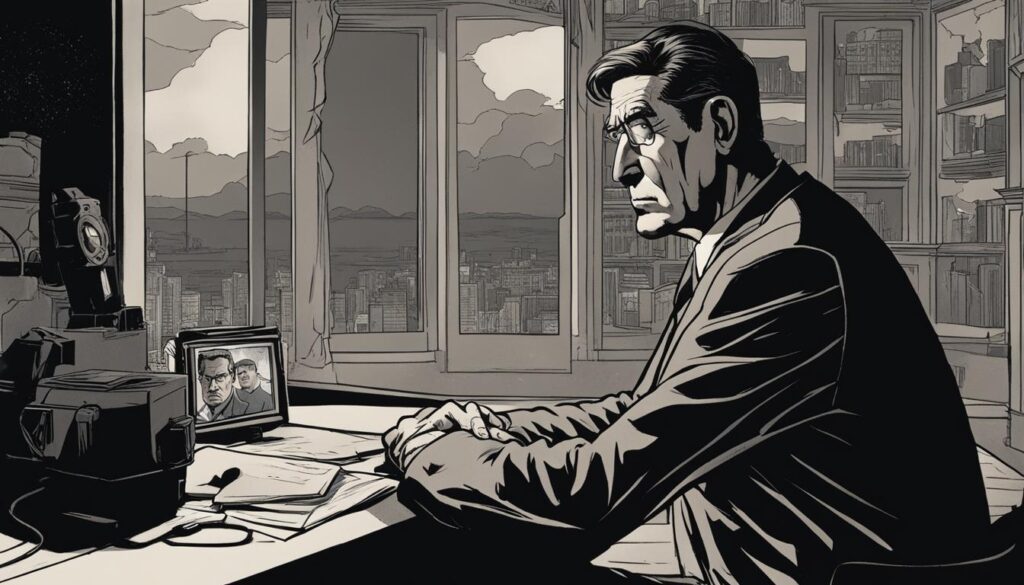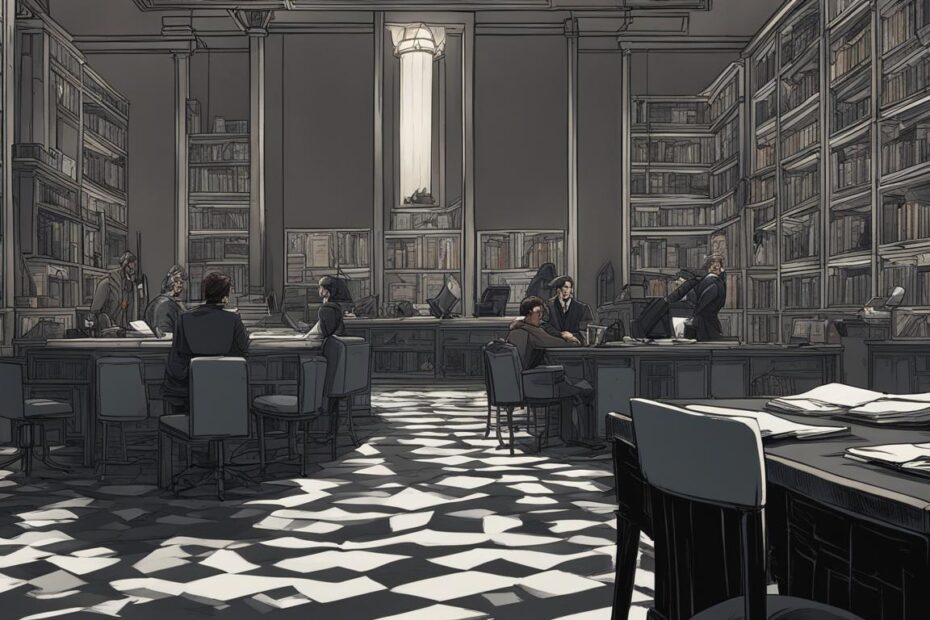There are certain books that leave an indelible mark on readers, and the way they conclude is instrumental in creating a lasting impact. George Orwell’s 1984 is one such book. Its intriguing and powerful ending has left generations of readers questioning the nature of power, control, and resistance. So, how did the book 1984 end? This article will explore the psychological and sociopolitical aspects of the 1984 book ending, shedding light on the gripping conclusion of 1984 book that has captivated the minds of countless readers.
Key Takeaways
- 1984 deals with themes of power, control, and resistance, all of which are explored in depth in the book’s ending.
- The fate of protagonist Winston Smith plays a crucial role in understanding and interpreting the conclusion of the book.
- Orwell’s dystopian narrative offers insights into the human condition and how individuals react under extreme social and political circumstances.
- The book’s ending is both memorable and haunting, with its powerful imagery and profound implications for the nature of society and governance.
- 1984 continues to resonate with readers, sparking discussions and influencing perceptions of what it means to live in a surveillance state.
The Climactic Turn: Understanding the Resolution of 1984
As we dive into the core of Orwell’s masterwork, the final events in book 1984 reveal a harrowing tale of betrayal and torture that encapsulate the novel’s central tension between resistance and surrender. As a reader, I couldn’t help but recognize the elements of personal and political stress that contribute to the narrative’s resolution. Indeed, the outcome of the 1984 novel highlights the chilling effects of an oppressive society on the human psyche. At the heart of this gripping tale lies the protagonist, Winston Smith, whose psychological breakdown is crucial to understanding the resolution of the 1984 book.
Throughout the story, Winston is relentlessly subjected to the stressors imposed by a totalitarian regime determined to break him at any cost. As I turned each page, I felt the weight of these stressors mounting. From being constantly monitored and manipulated, to enduring the sadistic machinations of the Party, the chilling nature of his environment gradually wears him down. These factors ultimately lead to his psychological breakdown, a dark and dramatic moment that is essential to grasping the concluding chapter in 1984.
What was most striking to me in this climactic portion was the manner in which Orwell portrays his protagonist’s struggle – a constant back-and-forth between an innate human desire to maintain individuality and a relentless push by external forces to mold him into complete surrender. The Party’s cynical manipulation of human frailty brings to light the extremes that can be taken to enforce conformity and control. As I delved deeper into the novel, I found myself empathizing with Winston’s pain and anguish as he attempts to navigate his own suffering amid a pervasive sense of helplessness.
Ultimately, the resolution of 1984 serves as a cautionary tale, warning readers of the dire consequences that follow when an entire society is held hostage by a soul-crushing regime. The captivating narrative and its haunting finale leave a lasting impression on its audience, urging us to remain vigilant against the ever-present risks of totalitarianism and censorship in our world today.
Anatomy of a Dystopian Conclusion: Themes and Implications
In the wrap-up of the 1984 novel, we see a chilling portrayal of how a dystopian society can lead to the total annihilation of an individual’s autonomy and spirit. The themes in 1984 ending serve as a disturbing reminder of the ultimate consequences of unchecked totalitarian power. As we explore how the 1984 book concludes, let’s delve deeper into its core themes and the broader implications of dystopian resolution in literature.

One of the most pervasive themes in Orwell’s dystopian masterpiece is the omnipotent control enacted by the Party over every aspect of an individual’s life. This totalitarian regime systematically manipulates and distorts information and history to maintain its dominance. The emotional and physical torture inflicted upon Winston by O’Brien in Room 101 epitomizes the Party’s quest for complete control of even a person’s thoughts and feelings.
Another prominent theme in the story revolves around the manipulation and suppression of the truth. The Party indulges in chronic deception by controlling all forms of information and rewriting history to suit its narrative. This manipulation is evident in the alteration of records, falsification of news, and the repression of rebellion, ideas, and freedom of speech. In the end, Winston, like all citizens of Oceania, is forced to accept the Party’s lies as the only truth.
A key aspect of 1984’s conclusion is the suppression of individuality. In the dystopian world created by Orwell, personal identity, love, and bonds are crushed in the name of collective dystopian ideology. The destruction of Winston and Julia’s relationship at the hands of the Party, along with Winston’s ultimate psychological submission to Big Brother, exemplifies this tragic loss of individuality.
The devastating implications of totalitarian ideology resonate with the reader, as the novel portrays a chillingly believable dystopian future, devoid of freedom, privacy, and hope. The emotional and intellectual impact of 1984’s ending lingers far beyond the last page and serves as a stark reminder of the potential consequences of unbridled authoritarianism.
In conclusion, the themes in 1984 ending offer readers crucial insights into the dark side of human nature, power dynamics, and the dangers of extreme societal control. By examining these themes, along with the dystopian resolution in literature, we can better understand the implications and lessons to be learned from Orwell’s chilling vision of the future.
Character Transformation: Winston Smith’s Final Journey

Exploring the Winston Smith character arc, we witness a profound development of Winston in 1984 as his psychological evolution unfolds. This transformative journey is shaped by extreme societal pressures, pushing him through adaptation stages and ultimately leading to his resignation to the Party’s ideology. In this section, we’ll delve into Winston’s psychological evolution, the influence of O’Brien, and the role of Room 101 to analyze his ultimate betrayal and acceptance.
The Evolution of Winston Smith
Winston’s character represents a powerful example of psychological evolution in literature. As the protagonist, he is constantly challenged and molded by the mental and environmental stresses within his dystopian world. He initially resists conformity, but due to the overwhelming force of the Party, he eventually succumbs to their control. The gradual shift of his beliefs and desires embodies the disturbing and persuasive power of totalitarian regimes, highlighting the importance of remaining vigilant against the encroachment of such control.
The Role of O’Brien and Room 101
O’Brien’s influence in 1984 is significant as he orchestrates Winston’s demise. As a cunning, manipulative character, he represents the personification and embodiment of the Party. Utilizing psychological manipulation in literature, he methodically dismantles Winston’s resistance by subjecting him to the horrors of Room 101. This vicious and relentless attack on Winston’s psyche breaks his sense of coherence and effectively eradicates any semblance of defiance.
The significance of Room 101 is further emphasized as it represents the ultimate tool of the Party’s oppressive control. This nightmarish chamber forces individuals to confront their deepest fears and insecurities, often breaking them mentally and emotionally. It signifies the oppressive reality of dystopian worlds, where no avenue of freedom or resistance remains unexplored, and every escape route is sealed by fear and submission.
The Ultimate Betrayal and Acceptance
Throughout the story, Winston’s determination to maintain his integrity is tested until he finally faces the ultimate betrayal in 1984. The sheer intensity of his suffering and the crushing weight of psychological pressure force him to betray the woman he loves, Julia. This devastating act signifies his acceptance of dystopian control and complete surrender to the Party’s ideology.
Winston’s surrender in literature presents a haunting and disturbingly realistic scenario of capitulation to authoritarian forces. It provokes readers to question the resilience of the human spirit in the face of overwhelming oppression and manipulation, and serves as a cautionary tale against submitting to the siren call of totalitarian control.
Reflecting on Orwell’s Vision: The Impact and Legacy of 1984’s Finale
When considering the impact of 1984’s ending, one cannot help but acknowledge the unsettling resonance it has with contemporary society. The novel’s conclusion forces readers to confront the grim reality of a world governed by surveillance, manipulation, and tyranny. Through the exploration of the psychological concepts from the “Third source,” such as the sense of coherence and generalized resistance resources, it becomes evident that Orwell’s chilling vision transcends literature and infiltrates our understanding of freedom and governance.
The legacy of Orwell’s 1984 lies in its enduring relevance and thought-provoking themes. Despite being published over half a century ago, the novel continues to inspire debates on the balance between individual liberties and state control, acting as a cautionary tale that warns against complacency in the face of totalitarian ideologies. The disintegration of Winston Smith’s sense of coherence and resistance resources serves as an unnerving reminder of the power that dystopian entities can wield over the human psyche, compelling contemporary readers to question the forces at play within their own societies.
As a prominent work in the genre of dystopian literature, 1984 has undeniably left its mark and influenced subsequent generations of writers. Its harrowing depiction of a world bereft of freedom and personal autonomy highlights the potential consequences of unchecked authority, sparking crucial discussions about the role of government and the preservation of individual rights. In conclusion, the dystopian literature influence of 1984 endures as a testament to the power and importance of Orwell’s art, providing a lens through which readers can reflect on the delicate relationship between society, governance, and the human spirit.
FAQ
How did the book 1984 end?
The book 1984 ends with Winston Smith’s psychological breakdown and eventual capitulation to Big Brother and the Party. After being betrayed by Julia and experiencing physical and mental torture in Room 101, he embraces the Party’s ideology and acknowledges his love for Big Brother.
What happens during the resolution of 1984?
In the resolution of 1984, Winston faces his ultimate fear in Room 101 and loses the last remnants of his rebellious spirit. He becomes a submissive and obedient Party member, completely relinquishing his individuality and humanity.
What are the main themes in 1984’s ending?
The main themes in 1984’s ending include power, control, and resistance, as well as the psychological struggle between individualism and totalitarianism. It delves into the depths of human vulnerability and showcases the devastating effects of an oppressive regime on one’s sense of self.
How does Winston Smith change throughout the novel?
Winston Smith’s character evolves from an underlying dissatisfaction with the Party to open rebellion and seeking out alternative truths. Eventually, however, he succumbs to the brutal physical and psychological punishment inflicted by the Party, transforming him into an obedient and brainwashed citizen who denies his own thoughts and emotions.
How is O’Brien significant in the ending of 1984?
O’Brien plays a crucial role in Winston’s ultimate downfall as he methodically dismantles Winston’s resistance and forces him to confront his deepest fears in Room 101. O’Brien’s manipulation and deceit break Winston’s sense of coherence, leading him to accept the Party’s ideology completely.
How has Orwell’s vision in 1984 impacted society and modern dystopian literature?
Orwell’s 1984 has had a profound impact on society and modern dystopian literature, as it has fueled discussion and awareness about the consequences of totalitarian regimes, the importance of individual rights and freedom, and the potential dangers of governmental surveillance and control. It has served as an influential cautionary tale, resonating with readers and shaping the landscape of dystopian narratives for generations.
